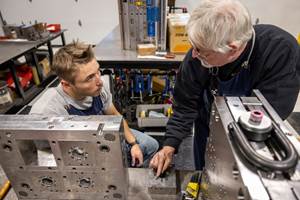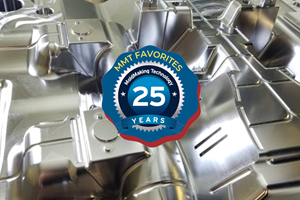Summit Mold: Better Not Bigger
Using the latest technology and a team effort approach yields sales aplenty-and an Honorable Mention in MoldMaking Technology magazine's Leadtime Leader competition.
Boasting a leadtime of five weeks, injection mold builder Summit Molds Inc. (Post Falls, ID) has managed to do $1.8 million in sales with a staff of just thirteen. One of its secrets is knowing what parts of the process to keep in-house and, which to outsource, according to co-owner Gene Bruce. He credits the company's success to the efforts of his team—which include loyal employees and select, dedicated subcontractors for specialty work and overflow.
Furthermore, this 5,400-square foot shop has seen an annual sales growth of 20 percent throughout the last several years—quite an accomplishment during tough times in the moldmaking industry. Industries served include electronics, medical, consumer and automotive.
Warming Up
Although the company was established only seven years ago, Bruce has spent thirty-five years in the moldmaking industry; and his partner Ron Finnicum is a twenty-one year industry veteran. Both spent years as apprentices and journeymen before banding together in March of 1997.
"Ron and I started the company with one other investor who had a lot of business experience and helped us get off the ground with the business," Bruce recalls. "We started in a small rented building of 1,500 square feet with one Bridgeport-type mill, one grinder, a new Fadal CNC and a new Handsvedt EDM."
Fortunately, they were well known locally, which helped their business take off. "We had a lot of connections from molders in the local area that we had worked with in the past," Bruce says. "We added two employees within six months and started adding machinery as we could. Luckily, in that time period there was a lot of work in our area. We were able to establish relationships with molders outside our immediate area and provide them with a quality product in a good timeframe. By 1999, we had outgrown our first shop, purchased land and put up our current building."
Today, the duo employ a group of "young, highly skilled people" from various areas of the U.S., Bruce says, with an average age of thirty-six. "In addition to people that have come to us from this area, we have other people who have come from Minnesota, Colorado and California," he notes. "Most live here because of the quality of life the area affords. We try to make this place the best place any of us has worked. We try to be fair and straightforward with everyone. Our turnover has been very low—which is one of the reasons we have done as well as we have. To live and work in a place as nice as this requires that we all work together, and I think to this point we have accomplished that."
Bruce and Finnicum also strive to keep their employees updated on modern technology. They bring in factory reps that are knowledgeable about the products they sell to educate the employees on items such as cutting tools. "They go over speeds, feeds, new products, etc.," Bruce states. "This has worked out very well as it is almost a mini-seminar for our people. It's made a tremendous difference in how we run our machines and the products we use. Periodically, seminars are available locally for our employees to attend. If any of our employees wish to take classes at the local college we pay for the class."
Scoring Tight Leadtimes
Bruce notes that Summit "makes quality production molds faster than anyone in our area. Three to four weeks is not uncommon." He describes Summit's strategy as follows. "In most cases, we have one person leading the job and other people assisting in areas such as grinding/EDM/mold base work, etc. We try to have all of our people working independently on the same job with as little supervision as possible. We try to combine jobs together when machining components. A person can make electrodes, slides, core pins, etc. for two or three molds at the same time—rather than working on one then going on to another. The lead moldmaker concentrates on core/cavity CNC work including electrodes (programming and cutting). The lead moldmaker will be in charge of many molds at one time, depending on our workload.
"Generally, we have one CNC for our three lead moldmakers with two Bostomatic electrode machines," Bruce continues. "We also have three other people who can help out programming and running all of these machines as well as run conventional machining and EDM. We have eight seats of Mastercam and all computers are networked so we can program any machine from any computer."
Summit runs its operations with very little paper, Bruce points out. "Everyone prints off small detailed 8x10 prints next to the computer to get information on core pins, water lines etc.," he notes. "These are kept in a job folder. We have no full-blown paper mold designs out on the floor."
Another key to maintaining Summit's short leadtimes is to keep spindles running. "We try to organize our EDM time to allow small burns requiring more programming and setup to run days and run our larger burns to run overnight and weekends," Bruce explains. "This is the area for which we are considering robotics in the future to allow us more unassisted burning."
When the going gets tough, Bruce calls for backup. "If necessary, we use selected subcontractors for specialty work like polishing and overflow, as well as for mold bases," he notes. "We then concentrate on cutting cores and cavities. We have built several molds in ten days. We recently built a fully hardened 1+1 mold for a drill doctor case and a two-cavity lens for the case in five weeks—with several other jobs going at the same time." Additionally, he will run the shop 24/7 if conditions warrant.
A Winning Season
Not surprisingly, offshore competition is Summit's number one hurdle to leveling the playing field. "We have countered by maintaining high-quality molds, upgrading equipment and training to improve leadtimes and pricing," Bruce says. "Our pricing is competitive with higher-priced Chinese shops and our leadtimes are better. We still can't compete with the small Chinese shops, but we can match—and in a few cases beat—some larger ones. We have had a lot of jobs in which we have been chosen over offshore suppliers because of price, and especially leadtime, with a quality mold that runs with very little tweaking. Many times it's not the price, but the leadtime that gets the job."
Future plans for the company include automation on EDMs, more CNC equipment and more high-speed mills, in addition to achieving ISO certification. "I think when this happens it can only improve our credibility with our customers," Bruce notes.
Staying focused is part of Summit's long-term game plan. "We will continue to do what we do best," Bruce says. "Maintaining high quality while continuing to shorten leadtimes through education and upgrading our equipment as much as possible. We need to refine what we have. With the economic climate as volatile as it is, we prefer to make what we have better not bigger. By improving our methods internally we can continue to provide a service people are looking for."
Related Content
Eden Tool and Eden Manufacturing: A Story of Resilience, Growth and Innovation
This critical parts manufacturer, founded on solid tooling fundamentals, didn’t get derailed with the unexpected passing of the owner because leadership was already building a solid business, not just a good tool shop. Here’s how they managed change incrementally… and they’re not finished yet.
Read MoreMMT Chats: The Connection Between Additive Manufacturing Education and ROI
This MMT Chat continues the conversation with Action Mold and Machining, as two members of the Additive Manufacturing team dig a little deeper into AM education, AM’s return on investment and the facility and equipment requirements to implement AM properly.
Read MoreUnique Mold Design Apprenticeship Using Untapped Resources
To help fill his mold design skills gap, Jeff Mertz of Anova Innovations, is focused on high schools and underprivileged school districts, a school that has lower graduation and college entrance rates. The goal is a student-run enterprise.
Read MoreLeading Mold Manufacturers Share Best Practices for Improving Efficiency
Precise Tooling Solutions, X-Cell Tool and Mold, M&M Tool and Mold, Ameritech Die & Mold, and Cavalier Tool & Manufacturing, sit down for a fast-paced Q&A focused on strategies for improving efficiencies across their operations.
Read MoreRead Next
Reasons to Use Fiber Lasers for Mold Cleaning
Fiber lasers offer a simplicity, speed, control and portability, minimizing mold cleaning risks.
Read MoreHow to Use Strategic Planning Tools, Data to Manage the Human Side of Business
Q&A with Marion Wells, MMT EAB member and founder of Human Asset Management.
Read MoreHow to Use Continuing Education to Remain Competitive in Moldmaking
Continued training helps moldmakers make tooling decisions and properly use the latest cutting tool to efficiently machine high-quality molds.
Read More



















